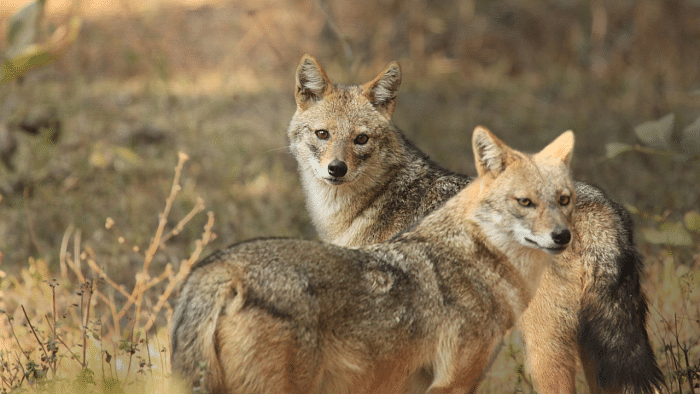
A first-of-its-kind scientific research study has been initiated which aims to get baseline data on the ecology of golden jackals in the Mumbai Metropolitan Region (MMR), to be conducted by the Mangrove and Marine Biodiversity Conservation Foundation of Maharashtra and the Wildlife Conservation Society- India between December 2022-June 2023.
The objective of the study is to document the presence of golden jackals and other small carnivores utilising the mangrove habitat using sign surveys and remotely triggered camera traps. Apart from this it also aims to understand the jackals’ diet and study interspecific interactions between jackals, domestic dogs and humans.
Amongst the wild canids found in India, Golden jackals are the most widespread species occupying varied habitat types ranging from forests and grasslands to agricultural landscapes. The mangrove ecosystem is one unique habitat utilised by golden jackals. Jackals existed in Mumbai right when Mumbai was an archipelago of seven islands.
About 109 years ago, golden jackals were documented being chased by a pack of wild dogs from Charni Road station to Marine Drive.
Today, golden jackals are restricted to the mangrove forest in the Mumbai Metropolitan region. There is very little information on golden jackals’ ecology from this mangrove habitat of Mumbai, Thane and Navi Mumbai. Most information on jackals is based on opportunistic sightings from nature enthusiasts, bird watchers and rescues done by various nature and wildlife-related NGOs. No data is available on the population and distribution of golden jackals.
This study will give information about golden jackal’s; distribution, diet, and interactions with humans and domestic dogs. We will also get information on other mammalian species found in this habitat.
Virendra Tiwari, Additional Principal Chief Conservator of Forests, Mangrove Cell, Mumbai and Executive Director, Mangrove and Marine Biodiversity Foundation of Maharashtra. “Golden jackals are one of the top carnivores in Maharashtra’s mangrove forests. They form an important part of the food chain in this mangrove ecosystem. This study will help us understand the ecology of golden jackals in the mangrove habitat and thereby help us in their conservation along with other species.”
“This pioneering study will help us document the presence of golden jackals and other small carnivores from this landscape. We will also be able to document various interactions between jackals and humans in this human-dominated landscape,” Dr Manas Manjrekar, Deputy Director, Research and capacity building Mangrove and Marine Biodiversity Foundation of Maharashtra said.
Nikit Surve from the Human-Wildlife interactions program at Wildlife Conservation Society–India, who will be leading this project along with Dr Devcharan Jathanna of WCS-India, said: “We will conduct this study in different phases covering mangrove forest patches at Thane creek flamingo sanctuary, Central, Western and Navi Mumbai.”